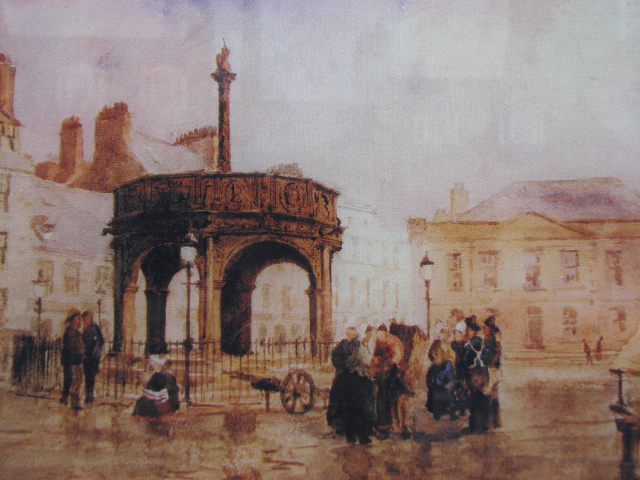Having travelled many times around Scotland, I noticed that many Scottish towns have a unicorn carved on the pinnacle of its ‘Merkat’ Cross.
Why so?…
Because the ‘Mercat’ (market) cross was the traditional heart of the burgh and although we now look at the unicorns as a mythical creature, in times past there were a lot who believed in their existence and of the magical powers they possessed. 🙂

Aberdeen Unicorn Mercat Cross – Scotland © Scotiana.com
The unicorn is the national animal of Scotland.
The Royal Coat of Arms of Scotland, used prior to 1603 by the Kings of Scotland was supported by two unicorns and the current royal coat of arms of the United Kingdom is supported by a unicorn for Scotland along with a lion for England.
A mercat cross is the Scots name for the market cross found frequently in Scottish cities, towns and villages where historically the right to hold a regular market or fair was granted by the monarch, a bishop or a baron. It therefore served a secular purpose as a symbol of authority, and was an indication of a burgh’s relative prosperity.
Historically, the term dates from the period before 1707 when Scotland was an independent kingdom, but it has been applied loosely to later structures built in the traditional architectural style of crosses or structures fulfilling the function of marking a settlement’s focal point.
Historical documents often refer simply to “the cross” of whichever town or village is mentioned. Today, there are around 126 known examples of extant crosses in Scotland, though the number rises if later imitations are added.
Source: Wikipedia
Wow…still 126 standing examples in Scotland !!! Don’t you think this is a great photographic challenge?
I do 🙂 and happy to share some photos taken during our multiple journeys across magnificent Scotland!
ABERDEEN

Aberdeen’s Unicorn Mercat Cross – Scotland © Scotiana.com
CULROSS

Culross unicorn Mercat Cross – Scotland © Scotiana.com
CUPAR
EDINBURGH
GLASGOW
The present Mercat Cross is a copy of one which stood here up to the mid-seventeenth century.
The Mercat Cross stands at the south-eastern corner of Glasgow Cross. Market crosses like this are found all over Scotland to mark the places where markets were legally held and this example represents one removed from Glasgow Cross in 1659. A town`s cross was often its symbolic centre as markets and other communal events took place beside it and the absence of such an important monument must have caused a bit of a dent in civic pride. The new cross was paid for by Dr William Black and his wife and its inauguration on 24 April 1930 was a day of great pomp and ceremony.
The next day`s Glasgow Herald reported that:
Probably not since 1649 when Charles II was proclaimed King to the accompaniment of a carillon from the city bells, has the Mercat Cross been the centre of such striking ceremonial… The gold, scarlet, and blue robes of the Lyon King of Arms and his heralds and pursuivants struck a note of brilliance, and stood out in bold relief against the black and ermine gowns of the Lord Provost and Magistrates… That pomp and circumstance, those gorgeous robes, the royal greeting, the arresting sound of the trumpets, the whole magnificent pageant, belonged not to that day alone, but to centuries of that past life which has made us a great nation.
The structure is in the form of an octagonal tower with the cross (which is topped by a heraldic unicorn holding a shield) rising high above it. On the tower`s western side a plaque declares that this is The Mercat Cross of Glasgow, built in the year of grace 1929. Above that is the coat of arms of the city with its motto Let Glasgow flourish.
Source: The Glasgow Guide
PERTH
PRESTONPANS
STIRLING
Enjoy!
Janice
PS: Interested to dig down further into the topic?
Here’s a list of Scottish places with Mercat Cross
*****
Further readings
On the Web: Scottish Market Crosses
On Amazon: Mercat Cross and Tolbooth













My great grandpa William T. Simpson designed the Mercat Cross on Catherine Street, Cupar. I would love to receive more information about him. We were also told that he was an art teacher. However we are unable to find any information on that.
Any information would be greatly appreciated.
Thank you
I don’t have a website